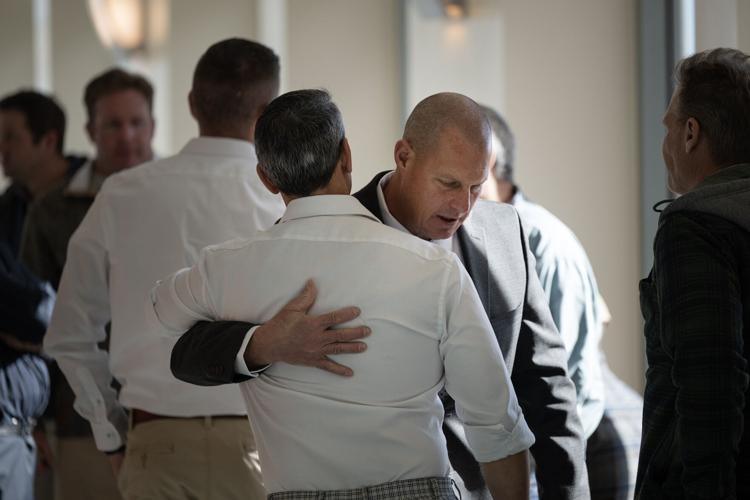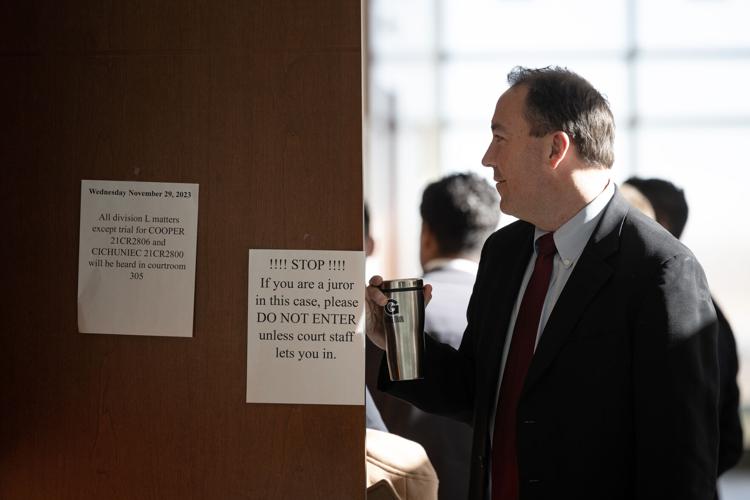Aurora paramedics testify, allege police hindered Elijah McClain treatment

FILE PHOTO: Aurora fire paramedic Jeremy Cooper, center, leaves the courtroom during a lunch break in his and Peter Cichuniec’s trial in the 2019 death of Elijah McClain, on Wednesday, Dec. 13, 2023, at the Adams County Justice Center in Brighton, Colo. (Timothy Hurst/Denver Gazette)
Timothy Hurst/Denver Gazette
The two Aurora paramedics facing trial for Elijah McClain’s 2019 death said on the witness stand they believed a dose of ketamine was necessary to treat the extreme agitation and aggression they thought he suffered from, based on their training that the condition could turn into a life-threatening emergency.
Both paramedics, Jeremy Cooper and Lt. Peter Cichuniec, testified in their own defense in an Adams County court on Monday. They said Aurora police who first contacted McClain stopped them from treating McClain effectively and didn’t tell them necessary information about his condition before they arrived. Those details included that an officer had used a neck control hold meant for restricting oxygen to a person’s brain, and that McClain repeatedly cried out he couldn’t breathe while subdued on the ground.
McClain, 23, died a few days after three Aurora police officers stopped him as he walked home from a convenience store the night of Aug. 24, 2019. They subdued McClain, handcuffed him and one used the neck hold. The paramedics now facing trial decided to give McClain a 500-milligram dose of ketamine, a sedative.
He went into cardiac arrest and stopped breathing within a few minutes of receiving the injection. A doctor declared him brain dead in the hospital three days later. Prosecutors say Cooper and Cichuniec made the decision to administer ketamine from only relying on police officers’ account of McClain’s behavior, without speaking to McClain themselves or physically examining them.
Paramedic training expert questioned about Aurora medics' actions
Cooper, who made the injection, said he continuously assessed and observed McClain after arriving at the scene. He described McClain as sweaty and breathing fast, and assumed he had an elevated heart rate, as well. Cooper explained Aurora paramedics were trained at the time that “excited delirium” was a dangerous condition that could lead to death, and ketamine was the only drug available to treat it.
When he heard police officers at the scene say McClain was displaying extreme strength and was “on something,” Cooper said that information confirmed to him that administering ketamine was the proper course of action.
“This just re-solidifies the protocol that I believe I’m following correctly,” he said.
Excited delirium is typically described as an onset of symptoms such as extreme aggression, strength and resistance to pain. But the diagnosis has drawn criticism as too vague a set of symptoms, and several major medical societies have chosen not to recognize it as a diagnosis. Aurora Fire Rescue stopped the use of ketamine about a year after McClain’s death.
Both paramedics said the police kept control of the scene, in part by insisting McClain stay handcuffed, until he was loaded onto the gurney. Their defense attorneys have sought to direct blame at the police officers throughout the trial.
Cooper repeatedly said he believed the Aurora police officers at the scene stopped him from trying to speak to McClain and taking his pulse. He said he was about to move in to “make contact” with McClain when Ofc. Randy Roedema slammed McClain’s torso into the ground, after McClain said, “I can’t fix myself.”
Cooper responded, “Just leave him there.”
On the stand, he testified the move by Roedema upset him. But he didn’t know whether he had legal authority to stop the officers’ actions, and Cooper’s own response was his attempt to de-escalate the situation, he said.
“At any point when you were tending to Elijah McClain, were you ignoring things that you saw?” asked Shana Beggan, one of Cooper’s defense attorneys.
“No, ma’am,” Cooper said.
Ketamine dose didn't kill Elijah McClain, defense experts for Aurora paramedics say
Senior Assistant Attorney General Jason Slothouber jumped on inconsistencies between the depiction of the scene on body-worn camera footage, statements the paramedics made during their interviews a few weeks later with the police department’s Major Crimes unit, and their memories while on the stand of the night. When the paramedics gave inconsistent testimony, Slothouber frequently replayed body-worn camera footage or showed them transcripts of their statements to a police detective.
Why did Cooper tell the detective he tried to ask McClain his name and medical history but admit on the stand he chose not to speak to the young man, Slothouber asked? Why did he testify he didn’t realize a risk of respiratory depression from ketamine goes up when the dose increase, but tell the detective back in 2019 he knew about the potential side effect? And why did Cooper say then that each time he tried to have McClain rolled onto his side, McClain tried to crawl away from police officers and walk up the grass he lay on?
“You understand you were talking to a detective?” Slothouber asked.
“Yes,” Cooper replied.
“Because somebody died?”
“Yes.”
“In the custody of you and the police?” Slothouber asked.
“Yes,” Cooper said.
The paramedics admitted they overestimated McClain’s weight in deciding how big a dose of ketamine to give him – ultimately about 50% too much, based on the Aurora fire department’s protocol at the time. But Cichuniec testified he chose to give him 500 milligrams because of the extreme agitated state the medics believed he was in. He said he wasn’t willing to risk under-medicating McClain.
Michael Lowe, one of Cichuniec’s defense attorneys, flashed a training slide describing excited delirium as a “life-threatening” emergency.
“In this case, suspected excited delirium, he could die,” Cichuniec said. “If we don’t act fast, it could kill you.”
Forensic pathologist testifies Aurora paramedics caused Elijah McClain's death
Slothouber pushed Cichuniec to admit the fire department’s training did not include anything in writing about increasing a dose for an extra-agitated patient.
“If you increase the dose because of his agitation level, that would be inconsistent with training,” Slothouber said.
“I would disagree,” Cichuniec replied, saying he believed the training contained the spirit of the idea.
Slothouber later went through the fire department’s list of six “rights” medics are trained on: the right drug, the right patient, the right dose, the right time, the right expiration and the right documentation.
He also reminded the court of Aurora’s protocol to calculate a ketamine dose of 5 milligrams per kilogram of the patient’s weight.
“Within the terms of the protocol, it was the wrong dose,” Slothouber said.
“Correct,” Cichuniec said.
Cooper and Cichuniec’s trial will resume Tuesday.
Judge Mark Warner also issued a new decorum order Monday prohibiting any conversations or interviews with reporters and audio, video or photography outside the courtroom. He made the order after a report that a reporter approached a jury member in a store to speak after the case.
“This action is a direct invitation for the juror to ignore the court’s repeated order not to speak with anyone about the case and an invitation for contempt proceedings,” Warner wrote.
Cooper and Cichuniec each face charges of reckless manslaughter, criminally negligent homicide and two counts each of second-degree assault for McClain’s death. The assault charges include assault causing serious bodily injury and unlawfully administering the sedative without consent.
In the context of criminal charges, recklessness means consciously ignoring a known risk of a person’s actions. Negligence refers to a person failing to perceive a substantial risk of their actions through a “gross” deviation from a reasonable standard of care.
The paramedics have pleaded not guilty.






